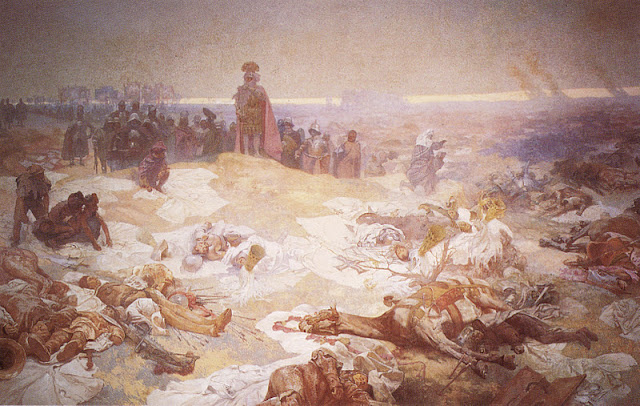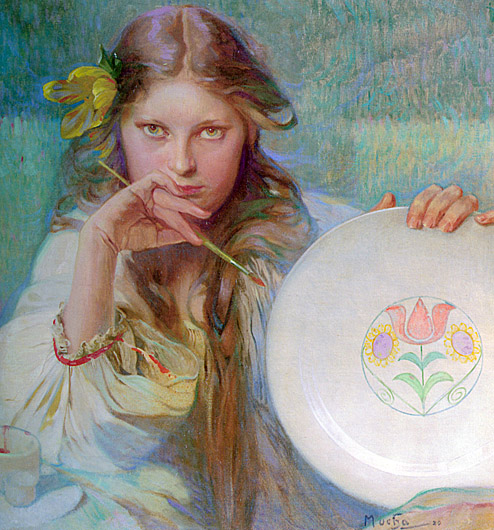Alphonse (Alfons) Mucha (1860 – 1939) was a Czech painter and decorative artist born in 1860 born in the town of Ivančice, Moravia. He is best known for his luxurious poster and product designs, which encapsulate the Art Nouveau style. Contemporary interest in his work was revived in 1980 after an exhibition at the Grand Palais in Paris.
For biographical notes on Mucha see part 1. For earlier works see parts 1 - 9 also.
This is part 10 of a 12-part series on the works of Alphonse Mucha:
This is part 10 of a 12-part series on the works of Alphonse Mucha:
The Slave Epic
After spending many years in Paris and America, Mucha returned to Prague in 1910 with the Slav Epic project as his driving ambition. He had arranged funding from the American, Charles Crane, and the work occupied the years 1912 to 1928. The first eleven canvases were displayed in Prague's Klementium in 1919 to great public interest and acclaim. Critical opinion though was hostile, being out of sympathy with what was seen as its dated nationalism and academic style.
After spending many years in Paris and America, Mucha returned to Prague in 1910 with the Slav Epic project as his driving ambition. He had arranged funding from the American, Charles Crane, and the work occupied the years 1912 to 1928. The first eleven canvases were displayed in Prague's Klementium in 1919 to great public interest and acclaim. Critical opinion though was hostile, being out of sympathy with what was seen as its dated nationalism and academic style.
Various canvases from from the sequence
were displayed in both Czechoslovakia and America over the next twenty years
producing a similarly ambivalent reaction. Mucha gifted the Slav Epic to
the city of Prague in 1928; ironically, the poster he created to mark the
occasion is perhaps more famous than the work itself.
 |
| 1928 The Slav Epic poster |
The city However, was unwilling to provide a permanent exhibition space for the work and, after a temporary showing in 1835, the canvases were rolled up and plaved in storage, Ehen Mucha died in 1939, his spirit had been broken by what he saw as the failure of his life's great work.
Not surprisingly, the post-war Communist government had little interest in restoring the series to public display and it was to remain out of view for many years. In 1950, 11 years after Mucha's death, the epic was transferred to Moravsky Krumlov, near his hometown of Ivancice. Then, in 1963, after nearly 30 years out of sight, the first nine paintings in the series were exhibited and finally, in 1967, the entire Slovanska Epopej returned to public exhibition.
Not surprisingly, the post-war Communist government had little interest in restoring the series to public display and it was to remain out of view for many years. In 1950, 11 years after Mucha's death, the epic was transferred to Moravsky Krumlov, near his hometown of Ivancice. Then, in 1963, after nearly 30 years out of sight, the first nine paintings in the series were exhibited and finally, in 1967, the entire Slovanska Epopej returned to public exhibition.
 |
| 1912 Bulgarian Tsar Simeon - The Founder of Slavonic Literature tempera on canvas 610 x 810 cm © Alphonse Mucha Estate/Artists Rights Society (ARS), New York/ADAGP, Paris |
 |
| 1912 Czech King Otakar II Přemysl - The Union of Slavonic Dynasties tempera on canvas 610 x 810 cm © Alphonse Mucha Estate/Artists Rights Society (ARS), New York/ADAGP, Paris |
 |
| 1912 The Celebration of Svantovit on Rujána - When Gods Fight, Salvation is in the Arts tempera on canvas 610 x 810 cm © Alphonse Mucha Estate/Artists Rights Society (ARS), New York/ADAGP, Paris |
 |
| 1912 The Primeval Slavs - Between the Turanian Whip and the Gothic Sword tempera on canvas 610 x 810 cm © Alphonse Mucha Estate/Artists Rights Society (ARS), New York/ADAGP, Paris |
 |
| 1914 Defence of Sziget against the Turks by Nicholas Zrinsky - The Shield of Christendom tempera on canvas 610 x 810 cm © Alphonse Mucha Estate/Artists Rights Society (ARS), New York/ADAGP, Paris |
 |
| 1914 The Abolition of Serfdom in Russia - Work in Freedom is the Foundation of a State tempera on canvas 610 x 810 cm © Alphonse Mucha Estate/Artists Rights Society (ARS), New York/ADAGP, Paris |
 |
| 1914 The Printing of the Bible of Kralice in Ivancice - God Gave us a Gift of Language tempera on canvas 610 x 810 cm © Alphonse Mucha Estate/Artists Rights Society (ARS), New York/ADAGP, Paris |
 |
| 1916 After the Battle of Vitkov - God Represents Truth, not Power tempera on canvas 405 x 480 cm © Alphonse Mucha Estate/Artists Rights Society (ARS), New York/ADAGP, Paris |
 |
| 1916 The Meeting of Krizky - Sub Utraque tempera on canvas 620 x 405 cm © Alphonse Mucha Estate/Artists Rights Society (ARS), New York/ADAGP, Paris |
 |
| 1918 Jan Amos Komensky - A Flicker of Hope tempera on canvas 405 x620 cm © Alphonse Mucha Estate/Artists Rights Society (ARS), New York/ADAGP, Paris |
 |
| 1918 Petr Chelcicky at Vodnany - Do not repay evil with evil tempera on canvas 405 x 620 cm © Alphonse Mucha Estate/Artists Rights Society (ARS), New York/ADAGP, Paris |
 |
| 1924 After the Battle of Grunwaldu - The Solidarity of the Northern Slavs tempera on canvas 405 x 610 cm © Alphonse Mucha Estate/Artists Rights Society (ARS), New York/ADAGP, Paris |
 |
| 1925 The Apotheosis of the Slavs - Slavs for Humanity tempera on canvas 405 x 480 cm © Alphonse Mucha Estate/Artists Rights Society (ARS), New York/ADAGP, Paris |
 |
| 1925 The Hussite King Jiri z Podebrad - Treaties are to be Observed tempera on canvas 405 x 480 cm © Alphonse Mucha Estate/Artists Rights Society (ARS), New York/ADAGP, Paris |
 |
| 1926 Holy Mount Athos Sheltering the Oldest Orthodox Literary Treasures tempera on canvas 405 x 480 cm © Alphonse Mucha Estate/Artists Rights Society (ARS), New York/ADAGP, Paris |
 |
| 1926 The Oath of Omladina under the Slavic Linden Tree - The Slavic Revival tempera on canvas 480 x 405 cm © Alphonse Mucha Estate/Artists Rights Society (ARS), New York/ADAGP, Paris |
 |
| Mucha at work on The Slav Epic in 1912 © Alphonse Mucha Estate/Artists Rights Society (ARS), New York/ADAGP, Paris |
 |
| The Slav Epic on display |
 |
| 1913 'Regional Exhibition at Ivančice' lithograph 93 x 59 cm © Alphonse Mucha Estate/Artists Rights Society (ARS), New York/ADAGP, Paris |
 |
| 1913 'Regional Exhibition at Ivančice' photographic study © Alphonse Mucha Estate/Artists Rights Society (ARS), New York/ADAGP, Paris |
 |
| 1913 A Woman in a Folk Costume chalk 34 x 28 cm © Alphonse Mucha Estate/Artists Rights Society (ARS), New York/ADAGP, Paris |
 |
| 1913 Portrait of a Girl © Alphonse Mucha Estate/Artists Rights Society (ARS), New York/ADAGP, Paris |
 |
| 1914 'The Spring Festival of Song and Music in Prague' Poster © Alphonse Mucha Estate/Artists Rights Society (ARS), New York/ADAGP, Paris |
 |
| 1914 'The Spring Festival of Song and Music in Prague' photographic study © Alphonse Mucha Estate/Artists Rights Society (ARS), New York/ADAGP, Paris |
.jpg) |
| 1916 Spring ( also used on 'Hearst's International' cover 1922 ) oil on canvas 60.3 x 40.5 © Alphonse Mucha Estate/Artists Rights Society (ARS), New York/ADAGP, Paris |
 |
| 1916 The Slavonic Epic Poem tempera on canvas 610 x 40.5 cm © Alphonse Mucha Estate/Artists Rights Society (ARS), New York/ADAGP, Paris |
 |
| 1916 The Slavonic Epic Poem study pastel on paper 52 x 35.5 cm © Alphonse Mucha Estate/Artists Rights Society (ARS), New York/ADAGP, Paris |
 |
| 1916 The Slavonic Epic Poem photographic study © Alphonse Mucha Estate/Artists Rights Society (ARS), New York/ADAGP, Paris |
 |
| 1917 A Winter Tale oil on canvas 124 x 99 cm © Alphonse Mucha Estate/Artists Rights Society (ARS), New York/ADAGP, Paris |
 |
| 1917 Libuše oil on canvas 230 x 110 cm © Alphonse Mucha Estate/Artists Rights Society (ARS), New York/ADAGP, Paris |
.jpg) |
| 1918 I Also Believe in God ( also used in 1927 on cover of 'JAS' ) © Alphonse Mucha Estate/Artists Rights Society (ARS), New York/ADAGP, Paris |
 |
| c1918 France Embraces Bohemia oil on canvas 122 x 105 cm © Alphonse Mucha Estate/Artists Rights Society (ARS), New York/ADAGP, Paris |
 |
| c1918 Naše Písen 100 x 138 cm © Alphonse Mucha Estate/Artists Rights Society (ARS), New York/ADAGP, Paris |
 |
| c1918 Naše Písen used on 1924 Calendar © Alphonse Mucha Estate/Artists Rights Society (ARS), New York/ADAGP, Paris |
 |
| c1918 Naše Písen photographic study © Alphonse Mucha Estate/Artists Rights Society (ARS), New York/ADAGP, Paris |
 |
| 1919 Christmas in America oil on canvas 81.2 x 76.8 cm © Alphonse Mucha Estate/Artists Rights Society (ARS), New York/ADAGP, Paris |
 |
| 1919 Jaroslava and Jiri, the Artist's Children oil on canvas 82.8 x 82.8 cm © Alphonse Mucha Estate/Artists Rights Society (ARS), New York/ADAGP, Paris |
1926 Czechoslovakian Banknotes
The first banknotes were issues of the
Austro-Hungarian Bank to which adhesive stamps were affixed. Denominations were
of 10, 20, 50, 100 and 1000 korun. Regular banknotes were issued by the
Republic of Czechoslovakia between 1919 and 1926, in denominations of 1, 5, 10,
20, 50, 100, 500, 1000 and 5000 korun.
The Czechoslovak National Bank took
over production in 1926, issuing notes for 10, 20, 50, 100, 500 and 1000 korun.
The new designs were made by Mucha. The urgency of the task led him to reuse a
previous portrait of Josephine Crane Bradley as Slavia for the 100 koruna bill.
 |
| 10 Korun banknote |
 |
| 50 Korun banknote reverse |
 |
| 50 Korun banknote reverse photographic study © Alphonse Mucha Estate/Artists Rights Society (ARS), New York/ADAGP, Paris |
 |
| 50 Korun banknote |
 |
| 100 Korun banknote |
 |
| 500 Korun banknote reverse |
 |
| 500 Korun banknote |
 |
| Study for 50 Korun banknote design © Alphonse Mucha Estate/Artists Rights Society (ARS), New York/ADAGP, Paris |
 |
| 1920 Cover of childrens book 'Andělíček z Baroku' © Alphonse Mucha Estate/Artists Rights Society (ARS), New York/ADAGP, Paris |
 |
| 1920 Croatian Woman with Apples oil on canvas 76.4 x 67 cm © Alphonse Mucha Estate/Artists Rights Society (ARS), New York/ADAGP, Paris |
 |
| 1920 Fate oil on canvas 51.5 x 53.5 cm © Alphonse Mucha Estate/Artists Rights Society (ARS), New York/ADAGP, Paris |
 |
| 1920 Girl with Loose Hair and Tulips oil on canvas 76.8 x 66.9 cm © Alphonse Mucha Estate/Artists Rights Society (ARS), New York/ADAGP, Paris |
 |
| 1920 The Artist oil on canvas 54.6 x 57.2 cm © Alphonse Mucha Estate/Artists Rights Society (ARS), New York/ADAGP, Paris |



No comments:
Post a Comment
Note: only a member of this blog may post a comment.